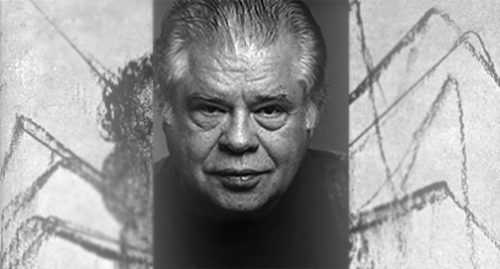Amidst the darkness of this past winter was the death of Clayton Eshleman, whose essay “The Aranea Constellation” inaugurated Rain Taxi’s chapbook series in 1998 (see here); Eshleman appeared as part of the first season of Rain Taxi’s event series later that year. We commemorate his passing here with an obituary written by Eshleman’s fellow poet-translator-traveler Pierre Joris, as well as an assortment of links to writing by and about CE available online, and an invitation to readers to send any “transcendent thoughts” (you define it) about this essential writer and his work by emailing us at info [at] raintaxi [dot] com. Meanwhile, we say farewell with these lines from Eshleman’s translation of Cesar Vallejo’s “Clapping and Guitar”:
Until we return! Until then!
Until we read, uncultured!
Until we return, let’s say goodbye!
OBITUARY
by Pierre Joris
Clayton Eshleman died during the night of Friday to Saturday January 29, 2021 at the age of 85. An award-winning author of close to a hundred books as poet, translator, and essayist, Eshleman was a major American literary figure of the second half of the 20th Century. Born and raised in Indiana, he began writing poetry in the late 1950s, traveling to Mexico and Peru, and spending two years in Kyoto, Japan — a time he considered his apprenticeship to poetry and translation. After years in New York (late ’60s) and Los Angeles (early ’70s), he and his wife Caryl settled in Ypsilanti, Michigan, with Eshleman teaching at Eastern Michigan University until his retirement. Besides the writing and translating, Eshleman edited two seminal literary magazines: Caterpillar (20 issues, 1967-1973) and Sulfur (46 issues, 1981-2000).
From the earliest work on, there is a force in Eshleman’s work, a hardcore probing that would close in on lost levels of our body-mind entanglements in us as individuals and as species. That thrust is summed up in the idea of a "grotesque realism," drawn from the Russian writer Mikhail Bakhtin (in his study of Rabelais) and transformed by Eshleman into a proposal for an "American grotesque." Of Eshleman's own practice, Eliot Weinberger has written: "It is an immersion in the [lower] body; not the body of the individual, the 'bourgeois ego,' but the body of all: the 'brimming over abundance' of decay, fertility, birth, growth, death . . . unfinished, exaggerated." From this base in his own body, he makes the leap (circa 1970) into the equally subterranean & mysterious cave-world of the European Paleolithic, enters it crawling (literally) "on all fours," to find in the animal beings painted on its walls a first "construction of the underworld" by "Neanderthal and Cro-Magnon men, women, and children, who made the nearly unimaginable breakthrough, over thousands of years, from no mental record to a mental record." This work culminates in a genre-defying masterpiece: Juniper Fuse: Upper Paleolithic Imagination and the Construction of the Underworld (2003).
Eshleman’s poetry and essays—from early volumes such as Coils (1973) or Fracture (1983) to An Anatomy of Night (2011) or Penetralia (2014) and most easily overviewed in The Grindstone of Rapport: A Clayton Eshleman Reader (2008)—are in turns ecstatic and comic, and, while always constituting what can be called an investigative poetry and poetics, often grim and terrifying in their accurate assessment of the present human state. This work was carried forward and accompanied by a remarkable series of translations of modern predecessors (Aimé Césaire, Cesar Vallejo, Antonin Artaud, Arthur Rimbaud, Michel Deguy and others), whom he calls (as an extension of his central image) “conductors of the pit" and with whom he enters into acts of both apprenticeship and struggle.
Among Eshleman’s recognitions and awards are a Guggenheim Fellowship in Poetry, 1978; the National Book Award in Translation, 1979; two grants from the NEA, 1979, 1981; three grants from the NEH, 1980, 1981, 1988; two Landon Translation Prizes from the Academy of American Poets, 1981, 2008; thirteen NEA grants for Sulfur magazine, 1983-1996; The Alfonse X. Sabio Award for Excellence in Translation, San Diego State University, 2002; a Rockefeller Study Center residency in Bellagio, Italy, 2004, and a Hemingway Translation Grant in 2015.
FURTHER LINKS
2004 Rain Taxi Review of Juniper Fuse by Sarah Fox
2007 Transcription of Talk on Translating The Complete Poetry of Cesar Vallejo by Clayton Eshleman
2015 Rain Taxi Interview with Clayton Eshleman by Stuart Kendall
2018 Essay by Clayton Eshleman at Pierre Joris’s Nomadics Blog
TRANSCENDENT THOUGHTS
To come.

